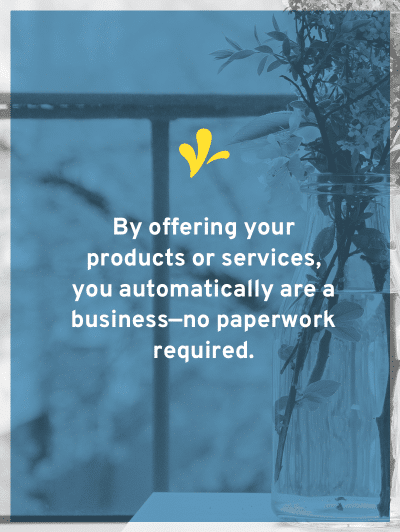I’m going to tell you a little secret: starting (or running) a creative business doesn’t require any legal paperwork.
In fact, by going out and offering your products or services with the intent to make a profit, you automatically are a business.

In legalese, this kind of business is called a sole proprietorship. And you become one as soon as you start—no paperwork needed.
If you are running a business with one or more friends, the legalese name is a partnership. And no paperwork is required here either.
You don’t have to file any paperwork, you don’t have to tell anyone.
All you need to do is:
- start an Etsy shop
- sell your art at a street fair
- head to a local store and ask them to stock your handmade products
- stop in the local coffee shop and ask them to hang your prints
- call a friend and offer your virtual assisting services
- post in a Facebook Group that you have a new offering
(Note: if you are thinking about forming an LLC, legal paperwork is required. To learn what’s needed, head here to read the seven steps required to create an LLC.)
But even though you aren’t required to do any paperwork, that doesn’t mean that you shouldn’t do any.
Instead, there are four legal tasks you should do when you start your business:
- get your permits and licenses
- file for a fictitious business name or doing business as statement
- get an employer identification number
- open a business bank account
Get your permits and licenses
You’ll likely be required to have various permits and licenses.
What’s required might be a:
- business license
- seller’s permit
- home occupancy permit
- fire permit
These permits and licenses are required even if you do business solely online.
Most of these licenses are required for the privilege of being a business.
Your city, county, or state doesn’t care that clients and customers aren’t visiting you. (Well actually they do, and if they are and you work out of your home, you’ll likely need a home occupancy permit.)
But you don’t get an out, just because you operate your business via your computer and website.
You are running a business out of your home/studio and it is located within a city or county. And your city/county will likely require you to get a business license because of that.
The permits and licenses you are required to get, however, do depend on:
- if your space is open to the public
- what kind of business you run
This means what permits and licenses you’ll need to get vary drastically from place to place. And from business to business.
How do you get your permits and licenses?
Because things vary so much, there’s not a one-stop shop I can send you to. Instead, you’ll have to do a little research.
To figure it out, you might:
- check out the Small Business Association website
- call or visit your local chamber of commerce
- visit your city/county/state website
- call City Hall
- hire me to do the research for you
Once you find out what permits and licenses you’ll need to get, then it’s time to apply.
Once again, in small business-friendly places, it will be easier to apply. So where you live will make a big difference in how you apply.
Some places allow you to apply online. For others, you can mail in a form. (These are my favorite because I can do them in soft pants on my couch!) But some you’ll have to put on real pants and head down to City Hall to make it happen.
Does your business have the required permits and licenses?

Did you know that a dba is only one of the government permits and licenses your creative business might need?
Inside my book, I’ll guide you step-by-step to feel confident that your business has the correct permits and licenses. The book also gives you a straightforward strategy to protect your ass(ets) without legal confusion. It’s the go-to guide you need to get all your legal ducks in a row.
(If you use the above Amazon affiliate link, I’ll make a small commission, but it doesn’t change the price you pay.)
How much will your permits and licenses cost?
Sadly, I don’t have a good answer here as well.
Fees might be based on:
- yearly flat rate
- percentage of your revenue
- percentage of your payroll
- hybrid of the above
But these costs are usually minimal and shouldn’t break the bank.
What if you’ve been in business for a while, will you get in trouble because you didn’t have permits/licenses?
In my experience, your local government wants to know that you are doing business. And they want you to fill out the forms and pay your fees.
They might assess a small late penalty (I believe that Oakland, CA charges $22 if you register late.)
But I haven’t seen them assess huge fines because you’ve been in business for a few years and didn’t tell them. (But if this happens to you, please let me know!)
File for a fictitious business name or doing business as statement
This statement goes by four names but is the same thing:
- a Fictitious Business Name (FBN)
- Doing Business As (DBA)
- Trade Name
- Assumed Name
They are interchangeable and called one or the other depending on where you live.
These are required when not obvious from a business name who the business owners are. So they exist so that the public can easily learn who is legally responsible for a business.
When you understand why they exist, it’s easy to guess when you need them.
You need one when:
- your business name does not include all of the owners’ legal names
- your business name suggests that multiple individuals own it
- your business name isn’t the same as your LLC or corporation name
**Important LLC/corporation note: If your LLC/corporation hasn’t filed a DBA/FBN for a brand/division/project then you aren’t doing business as your LLC but as you! (Meaning, your LLC status means nothing for that brand.) So filing for a DBA/FBN is critical if you want your LLC status for that part of your business.
This video breaks down not only examples of when you do (and don’t) need a dba, but why they are important and how to get one!
How do you get an FBN/DBA statement?
Often you apply for your FBN/DBA in the same place as you apply for your business license.
You’ll usually also have to publish a notice in your local newspaper. (I know it’s super old school.)
When you apply for your FBN/DBA, you’ll likely be given a list of newspapers that run legal notices. You’ll also likely be given instructions on how to run your legal notices.
Once you run your legal notices, you’ll likely have to tell them. Often the newspaper provides you with a form that you submit back to the government.
Newspapers are familiar with running these notices and are usually helpful. But they often have very different rates for publishing them. So it’s worth your time to call a couple to find the paper that does it for the lowest cost.
Once you have your FBN/DBA, you’ll have to renew it every few years.
Does your business have the required permits and licenses?

Did you know that a dba is only one of the government permits and licenses your creative business might need?
Inside my book, I’ll guide you step-by-step to feel confident that your business has the correct permits and licenses. The book also gives you a straightforward strategy to protect your ass(ets) without legal confusion. It’s the go-to guide you need to get all your legal ducks in a row.
(If you use the above Amazon affiliate link, I’ll make a small commission, but it doesn’t change the price you pay.)
Get an employer identification number
You don’t need employees to get an employer identification number (EIN) from the IRS.
This EIN number basically replaces your Social Security Number. It is used instead of your SSN on all documents that you would normally use your SSN on.
There are two reasons that I suggest getting an EIN from the IRS for your business.
You add a layer of protection between you and identity thieves
I’m not suggesting that your clients will steal your identity.
But accidents happen. They might store their files on a cloud platform that gets hacked. Or they might have a break-in at their brick-and-mortar shop.
A W-9 form contains everything someone needs to steal your identity.
So by giving them an EIN, you add a layer of protection to your personal information.
It makes your business look legit
Taking a few minutes to get an EIN shows that you are a business, and you treat your business like one. This isn’t some hobby or side project but how you are making your living.
Having an EIN sends a quiet and powerful signal that you are running a legit business. (Plus, it’s totally free!)
And it only takes about five minutes to order one of these numbers from the IRS.
Word of warning: If you do a Google search, companies will try to trick you into paying to get an EIN “instantly.”
Don’t fall for this scam.
If you go to the IRS website and apply, you can get your EIN number instantly.
All you need to do is select the option to have them provide you with your EIN number by PDF. If you pick that option, you’ll get your number instantly and for free.
Then once you have this number, use it on your:
- business license
- PayPal, Stripe, and other banking accounts
- all W-9 forms
- and anywhere else that asks you for a tax ID for your business
Open a business bank account
The final item also isn’t a legal requirement but will save you lots of headaches come tax time. And that is opening a business bank account.
I always suggest opening a business account because it starts the mental mind shift.
You start training your brain that your business isn’t your personal piggy bank. Your business is a living breathing thing that deserves a little respect and its own space.
Having a separate account also helps remind you what hat you are wearing when you do something. Are these art supplies for a client project? Or a personal one?
It also starts to help you understand exactly what’s coming in and going out. You’ll start to spot if your business is making (or losing) money.
You’ll start to discover how much money your business earns and what it costs to run your business each month.
It also will make you (and your tax preparer) super happy at tax time. Because it will reduce the headache of deciding what is and isn’t a business expense. You already know that everything that went through that account is a business expense.
Every bank has different requirements; so call ahead to see what they will need to open your account. But expect them to want your:
- EIN
- FBN/DBA (if you needed one)
- business license
TL;DR
And that’s it!
When you first start off, there are four tasks I think you should do:
- get your permits and licenses
- file for a fictitious business name or doing business as statement
- get an employer identification number
- open a business bank account
Here’s your challenge…
If you don’t have an EIN, I encourage you to spend 5 minutes right now getting one.
- go to the IRS website
- fill out your information
- request your EIN via a PDF letter
Want help getting all your legal ducks in a row?

Wish you had a straightforward strategy to protect your ass(ets) without legal confusion? Then the Legal Roadmap book is your go-to guide.
Inside this book, you’ll find three Maps that will help you build a business you love, built on a strong legal foundation. And you’ll get my guidance step-by-step to execute each of the action items contained in the Maps.
(If you use the above Amazon affiliate link, I’ll make a small commission, but it doesn’t change the price you pay.)

Hi! I’m Kiff! I’m your friendly legal eagle (and licensed attorney).
My goal is to add ease to the legalese. And because I think basic legal resources should be available to every creative, I create a lot of free content.
If I’ve created something that has helped inject a little ease into your creative business and you would like to say “thank you”, you can make a contribution here.
If you’d like to hear more from me, I’d love to pop into your inbox every Friday morning to share additional ways to cut through the red tape and inject a little ease.
Get tips from your friendly legal eagle in your inbox…
Your privacy is important to us. Learn how we protect it here.

